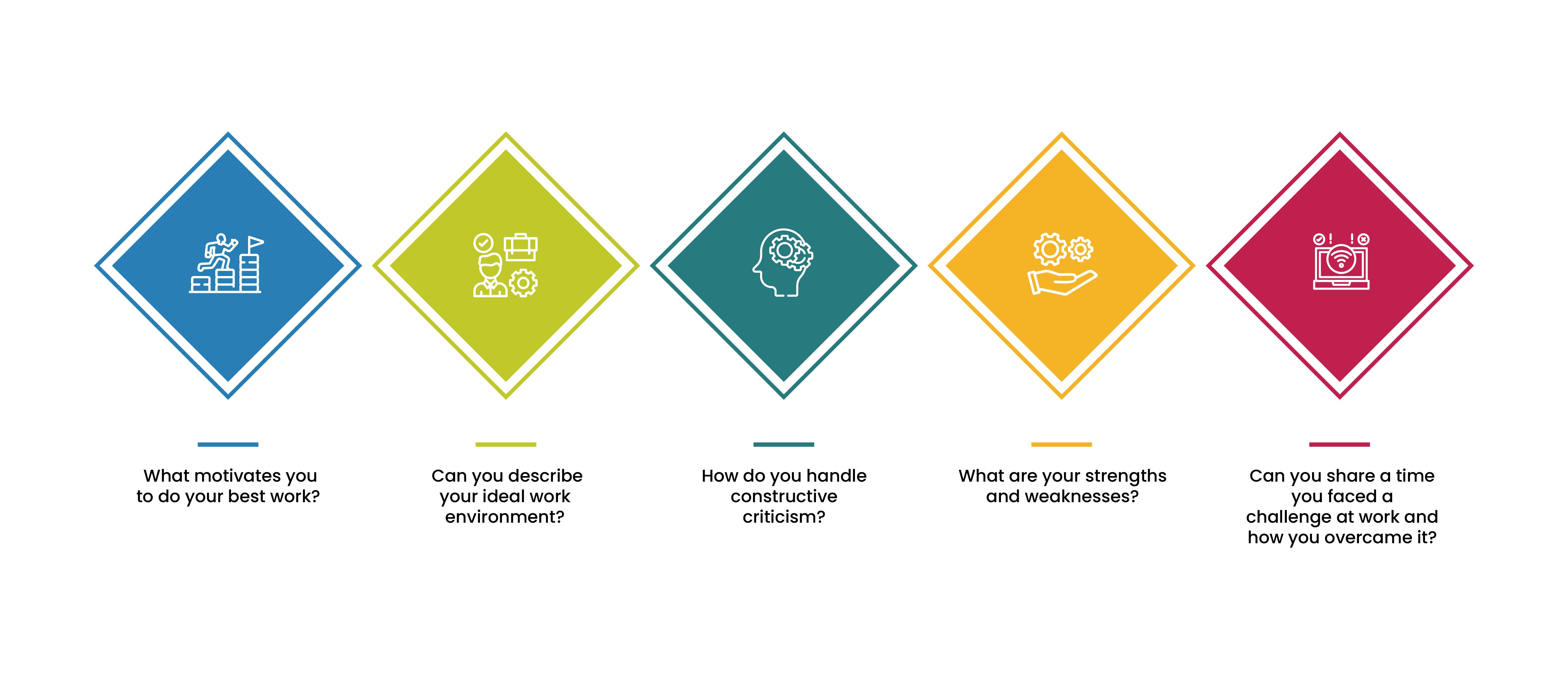Top 20 Personality Interview Questions to Ask Your Interviewee

As an interviewer, asking the right question is important to understanding a candidate’s personality and cultural fit within your organization. While technical skills and qualifications are essential, personality traits often determine long-term success and collaboration in a team.
In this article, we’ll cover the Top 20 Personality Interview Questions you can ask your interviewee, helping you gain insights into their character, work style, and potential contributions to your company.
Why Ask Personality Questions in an Interview?
Personality interview questions provide an opportunity to evaluate whether candidates will thrive in the company's culture. These questions go beyond traditional inquiries about roles and responsibilities. Instead, they focus on dynamics like work environment, leadership, and communication styles—key elements of long-term success in any organization.
For example, in roles related to a company that manages VMS software, personality questions can help you understand a candidate’s adaptability, communication style, and problem-solving skills is vital. These traits often determine how effectively they can manage vendor relationships and navigate challenges.
Key Personality Interview Questions

#1. What motivates you to do your best work?
This question helps you understand what drives a candidate and what kind of environment allows them to thrive. A candidate who thrives on challenges may be well-suited for fast-paced roles, while one who values collaboration may excel in team-oriented environments.
#2. Can you describe your ideal work environment?
Understanding a candidate's preferred work environment can reveal whether they would fit well within your company’s culture. For example, if your organization fosters a collaborative culture, a candidate who prefers a highly independent environment may not be the best fit.
#3. How do you handle constructive criticism?
This question sheds light on a candidate’s willingness to learn and adapt. In roles that involve vendor relationship management, being open to feedback is essential for continuous improvement and effective communication.
#4. What are your strengths and weaknesses?
This classic question allows candidates to self-reflect and provide insight into their self-awareness. Their response can reveal how they leverage their strengths and address their weaknesses, which is crucial in roles requiring collaboration with vendors and teams.
#5. Can you share a time you faced a challenge at work and how you overcame it?
This behavioral question helps you assess problem-solving skills and resilience. Look for candidates who demonstrate a proactive approach to overcoming obstacles, which is particularly valuable in vendor management scenarios where challenges are common.
Understanding Team Dynamics
#6. How do you prefer to communicate with team members?
Communication style is key to team dynamics. Understanding a candidate’s preferred communication methods can help you assess their compatibility with existing team members, especially in collaborative roles that require regular interaction.
#7. What role do you typically take in group projects?
This question helps identify whether the candidate is a leader, a supporter, or a contributor in team settings. Knowing how they function in groups can give insights into how they may interact with colleagues and vendors.
#8. How do you handle conflicts with team members?
Conflict resolution skills are vital in any team setting. A candidate’s approach to handling disagreements can indicate their emotional intelligence and ability to maintain professional relationships, particularly important in vendor management.
#9. What do you value most in a team?
This question reveals what a candidate prioritizes in a work environment, such as collaboration, innovation, or support. Understanding these values can help you determine if they align with your team's culture.
#10. How do you celebrate success within a team?
Asking about celebrations helps assess how a candidate views recognition and teamwork. A candidate who values shared success may contribute positively to team morale, making them a good fit for roles that require collaboration.
Leadership and Work Environment

#11. How would you describe your leadership style?
If the candidate has prior leadership experience, understanding their style can reveal how they interact with others. A candidate who emphasizes collaboration may be well-suited for roles that involve managing vendor relationships and fostering teamwork.
#12. What does professional growth look like for you?
This question helps you gauge a candidate’s ambitions and commitment to personal development. Candidates who seek growth opportunities are likely to bring innovation and fresh ideas to the organization, which is essential in fast-evolving fields like vendor management systems.
#13. How do you maintain work-life balance?
In today’s demanding work environments, understanding how candidates prioritize work-life balance can provide insight into their well-being and productivity. Candidates who value balance are often more resilient and engaged.
#14. What is your approach to handling stress?
Stress management techniques can indicate how well a candidate will cope with challenges and tight deadlines. This is particularly important in high-pressure roles, such as those involving complex vendor management tasks.
Adaptability and Innovation
![]()
#15. How do you respond to change in the workplace?
This question assesses a candidate's adaptability. In roles related to vendor management systems, where processes and technologies may evolve rapidly, candidates who embrace change will likely succeed.
#16. Can you give an example of a time you innovated or improved a process?
Understanding a candidate's ability to innovate is crucial for organizations looking to stay competitive. Look for examples that showcase creativity and initiative, especially in the context of improving workflows or vendor interactions.
#17. How do you handle failure?
This question reveals resilience and a growth mindset. Candidates who view failure as a learning opportunity are often better equipped to navigate the challenges of managing vendor relationships.
Long-term Outlook
#18. Where do you see yourself in the next few years?
This question provides insights into a candidate’s career aspirations. Understanding their long-term goals can help you assess whether they align with your organization's growth trajectory.
#19. What do you think is the most important quality in a leader?
This question can reveal a candidate’s values and what they aspire to in a leadership role. Their answer may help you understand how they view collaboration, vision, and accountability.
#20. How do you contribute to a positive company culture?
Candidates who value and actively contribute to a positive culture are often great team players. Understanding their approach can help you assess their potential impact on your organization’s environment.
Final Thoughts
Asking the right personality interview questions can significantly enhance your talent acquisition process. These questions allow you to evaluate a candidate’s cultural fit, interpersonal skills, and potential contributions to your team.
By focusing on personality traits and values, you can better identify candidates who will thrive within your organization, particularly in roles that require effective management of vendor relationships and collaboration. Use these 20 questions as a guide to create meaningful conversations that reveal the true character of your interviewees.
If you found this content helpful, please explore our other resources for more insightful information:

.jpg?width=5520&height=3680&name=Understanding%20Team%20Dynamics%20(1).jpg)
-1.jpg?width=352&name=image%20(7)-1.jpg)


Your comments